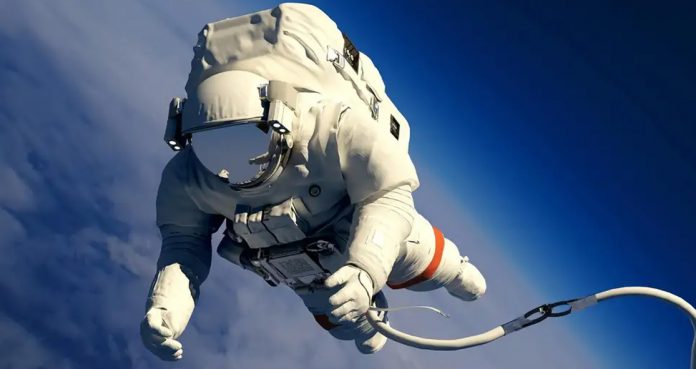According to new NASA research, astronauts who spend longer time in space are more likely to have viruses such as herpes, shingles, and chickenpox reactivate. Stress could be the reason behind viral reactivation.
Blood, urine and saliva samples were collected from cosmonauts before, during and after spaceflights and long-term International Space Station assignments. The investigators found that herpes reactivated in over 50 percent of the cosmonauts.
The study was published last week in a leading journal called Frontiers in Microbiology.
Satish K. Mehta, the lead author of the study from Johnson Space Center, said, “To date, 47 out of 89 (53%) astronauts on short space shuttle flights, and 14 out of 23 (61%) on longer ISS missions shed herpes viruses in their saliva or urine samples. These frequencies — as well as the quantity — of viral shedding are markedly higher than in samples from before or after flight, or from matched healthy controls.”
Here, shedding means the virus successfully reactivates.
The researchers explained that astronauts are exposed to zero gravity, cosmic radiations, and extreme G forces while taking-off and re-entering spaceflight. On top of that, they are confined in small spaces, social isolation, and an altered sleep cycle. This is what creates a very stressful environment for the cosmonauts, making way for dormant viruses to reactivate.
The investigators said that four out of eight types of herpes viruses were observed, which included oral and genital herpes, shingles, and chickenpox. The herpes viruses target the nerve and immune cells, so they are never really gone and can get reactivated.
However, the astronauts are a bit lucky because the virus reactivation does not necessarily mean that they experience the symptoms.
Mehta said, “Only six astronauts developed any symptoms due to viral reactivation. All were minor.”
However, the insinuation for infecting other people when the cosmonauts return to the earth is real, especially those who have immunocompromised immune systems or weak immune systems like in newborns.
It was found that shingles and chickenpox were still evident in the body fluids for up to 30 days after the cosmonauts returned.
The researchers will be looking forward to future long-term space assignments, which may take them through deeper space. It could take nearly three years for a round-trip to Mars.
Mehta stated, “The magnitude, frequency and duration of viral shedding all increase with length of spaceflight. The ideal countermeasure is vaccination for astronauts — but this is so far available only against chickenpox.”
The clinical trials of herpes virus vaccines have shown little promise, so the scientists are working hard on developing targeted treatment regimens for astronauts suffering the complications of viral reactivation.
The lead author said, “This research has tremendous clinical relevance for patients on Earth too. Already, our spaceflight-developed technologies for rapid viral detection in saliva have been employed in clinics and hospitals around the world.”
The effects of long-term spaceflight missions are well known, which include muscle and bone loss. To combat those adverse effects, the astronauts exercise regularly while there in the space.
In January, scientists studied the impact of prolonged spaceflight on immune cells of astronauts. They specifically studied the effects of spaceflight for six months on a type of white blood cell (WBC) called “natural killer (NK) cell”, which kills cancer cells in the body. These cells also prevent viruses from reactivating.
Richard Simpson from the University of Arizona and the senior study author said, “Cancer is a big risk to astronauts during very prolonged spaceflight missions because of the exposure to radiation. NK-cells are also very important to kill off virally infected cells. When you’re in the space station, it’s a very sterile environment — you’re not likely to pick up the flu or a rhinovirus or some community-type infection — but the infections that are a problem are the viruses that are already in your body. These are mostly viruses that cause things like shingles, mononucleosis or cold sores; they stay in your body for the rest of your life, and they do reactivate when you’re stressed.”
During the study, the researchers compared the blood samples collected from eight astronauts who spent time on the space station with healthy people who did not endure spaceflight. The blood samples were collected before, during and after spaceflight.
After evaluation, the researchers found that the NC cell function of the astronauts was impaired while they were on the space station. On the 90th day of their stay, blood samples of natural killer cell activity against blood cancer (leukemia) cells was reduced by nearly 50% in crewmembers.
Simpson said, “I don’t think there’s any doubt that NK-cell function is decreasing in the spaceflight environment when analyzed in a cell culture system.”
Just like in the recent study, the investigators in this study believed that the effects could be due to stress. The first-time astronauts found their first experience more stressful, exacerbating their cell response.
However, the study is not suggesting that astronauts are more vulnerable to cancer. Future studies might suggest that.
Simpson said, “The next question would be, how do we mitigate these effects? How do we prevent the immune system from declining during space travel? In order to do that, you have to first figure out what’s causing the decline: Is it stress? Is it microgravity? Is it radiation? Is it a plethora of things? When we figure that out, we can try to find ways to directly target those factors and mitigate them.” Meanwhile, scientists at Johnson Space Center are focusing on probable countermeasures to keep astronauts healthy in space, which include exercise, nutrition, and pharmacological. These countermeasures could all boost the immune system.





















